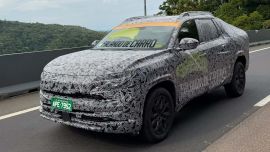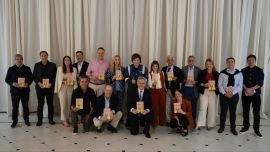For the one-way analyses imposed by the grieta chasm, the visit of Washington’s National Security Advisor is a pebble in the shoe for both sides.
Some find it hard to explain why, if the government is so obsessed with adhering to the Havana-Caracas-Managua axis, it should put so much effort into cosying up to US President Joe Biden. And, above all, why Biden should take seriously a country that is well on the way to becoming ‘Argenzuela.’
Others find it hard to explain why, if the superpower is responsible for harassing popular governments like those of Cuba, Venezuela and Nicaragua, its envoys should be given such a friendly reception.
Some opted to say that the delegation headed by Jake Sullivan came to protest human rights violations in those countries and to urge Argentina’s populist government to “reinforce democracy in the region.”
Others prefer to minimise and play down the visit, unsure what their audiences might think if they celebrate meetings with the ‘messengers of imperialism.’
Direct access
Sullivan is one of the senior officials with direct access to Biden. Something of a nerd, at the age of 44, he brings an unusual experience to the sphere of security and public policy. His visit has strategic relevance because it is his first to the region, and he brings with him the National Security Council director for the hemisphere, the head of the US State Department’s regional office, the director of Technology and Security and the director of Cybernetics. And it is relevant because he is the White House’s third envoy this year.
To the difficulty which these visits cause to those who need to understand the world in black and white terms should be added the letter which Biden himself sent to his Argentine colleague three weeks ago, thanking President Alberto Fernández for his participation in the recent climate change summit, which the new White House occupant had convoked to differentiate himself from his predecessor, Donald Trump: “I think that together we have succeeded in promoting a global commitment to raising our goals regarding the climate.” Biden followed up this letter with 3.5 million vaccines, now promising a further free delivery of Moderna and Pfizer.
5G
The United States delegation arrived from Brazil where their meetings had been preceded by tension with a government which had openly bet on Trump’s re-election and which is preparing to tender its 5G networks with the Chinese giant Huawei.
Even if the diplomatic umbrellas dodged any discomfort, Sullivan will take to Washington the image of Jair Bolsonaro as the closest thing to Trump he has seen in his life.
None of the members of the Argentine committee interacting with the visitors during the seven meetings lasting 12 hours heard the rumour circulating that day in Brasilia that Brazil had been offered full NATO membership in return for blocking entry of the Chinese 5G.
The history of the visit to Buenos Aires began a month ago via virtual meetings between Sullivan and his Argentine counterpart Gustavo Beliz, first joined by Argentine Ambassador to Washington Jorge Argüello and then by Foreign Minister Felipe Solá and fellow-ministers Martín Guzmán (Economy) and Matías Kulfas (Productive Development).
But only in recent days did the full scope of the trip become known. Indeed, the first interpretation of government and opposition sectors alike was that it was a “rush visit” to head off the advance of Chinese technology in this country. This reading was based on the names and specialties of those making up the US delegation.
The sources consulted mentioned that 5G was one of the points tackled. There were no concrete requests but there were some clear diplomatic messages on the part of the visitors, such as: “Nobody is against the countries of the continent doing business with China but we are sensitive over issues like national security.”
Local officials affirm that they explained to them that Argentina was open to competition for 5G and the regulatory frameworks for the installation of that technology are subject to public consultation.
Chinchulines
After a lunch of almost three hours in Olivos that Friday, Alberto Fernández was left with the impression that his guests deepened their trust in him and Argentina. This might be wishful thinking derived from the fact that only the areas of agreement between the two governments were mentioned and that the visitors devoured the asado without even inquiring into the origins of that weird stuff locally known as chinchulines (“chitterlings”).
But what is certain is that in US eyes, Argentina has yet to show that it is an indispensable and trustworthy partner. And the cordiality which the president may have noted in his guests does not mean that Vice-President Cristina Fernández de Kirchner and her Latin American pals have ceased to represent a worry for superpower diplomacy.
At all events it might perhaps mean that the Democratic administration wishes to interpret pragmatically that Alberto is not the same as Cristina.
US attention to climate change and the global economic balance of power, the proposals for advancing in vaccination against Covid-19, the acceptance of multilateralism as the format for international relations for countries like Argentina, the revival of trade unionism, the promise to back the debt agreement with the International Monetary Fund (besides having given the OK for the transfer of special drawing rights, which Trump had rejected), ratified for the president his idea that Biden’s first names are Juan Domingo.
When Argüello is asked as to the message left by the visit, he replies: “The visit is the message.” He explains that, apart from the bilateral agenda opening up while differences will continue to exist, the trip in itself represents a political message.
His next objective is to translate this into a meeting between Fernández and Biden before this year is out. Difficult considering that since his inauguration, hampered by the pandemic, the US president has only received three heads of government: those of Japan, South Korea and Germany, all key partners.
‘Cartoon’ politics
Amid the discomfort of the leaders on both sides of the grieta rift in understanding the true meaning of the visit’s message, it passed by almost unnoticed that a World Bank loan of US$500 million for the purchase of Moderna and Pfizer vaccines (the first loan of its kind from that organism) was defined while two investments were announced – one of US$300 million from General Motors (delayed) and the other of US$200 million from the renewable energy company AES.
Jake Sullivan was due to stay overnight in Buenos Aires but left that same Friday night, apparently driven by the urgency of the tensions on the US southern border with the most arrests in decades.
Before boarding the aircraft, he spoke of “cartoon” politics, referring to the aftermath of Trump in his own country with the politics of social and media polarisation and with leaders converted into caricatures.
It’s probable that it was also a synthesis of what he saw in Argentina.























Comments